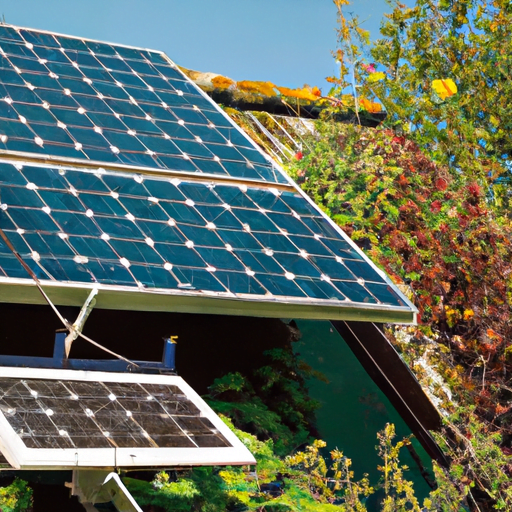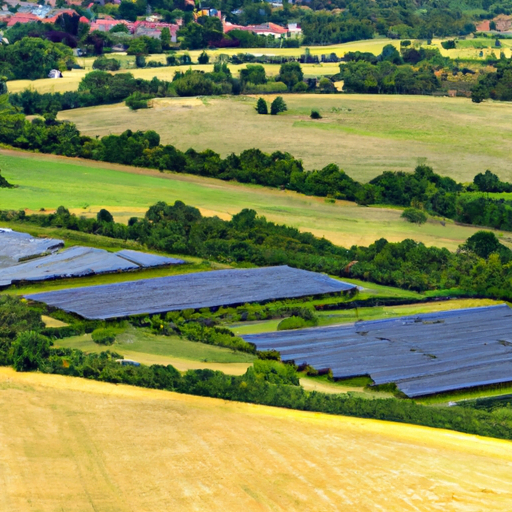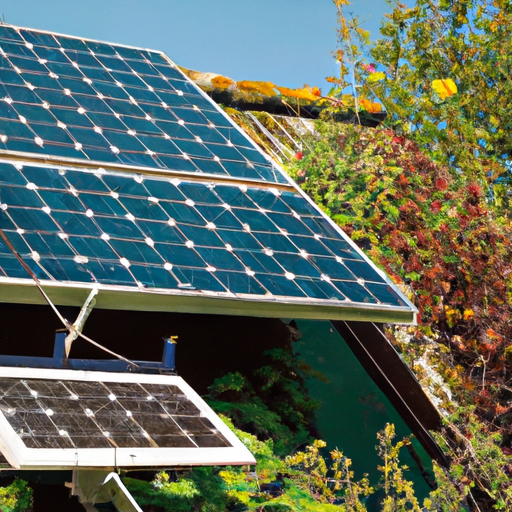So, have you ever wondered what it would be like to live off the grid? You know, disconnecting from the hustle and bustle of modern life and embracing a simpler, more sustainable way of living? Well, if you have, you’re not alone! Many people are becoming increasingly interested in off-grid living, and it’s not hard to see why. There’s something appealing about being self-sufficient and reducing your reliance on traditional energy sources. But you might be wondering, can you actually go off-grid with solar panels in the UK? The answer is yes, and in this article, we’ll explore the various options available to you.
Now, when it comes to off-grid living, solar panels are a popular choice. They harness the power of the sun to generate electricity, allowing you to live without being connected to the national grid. In the UK, despite the reputation for cloudy weather, solar power is still a viable option. You see, solar panels don’t actually require direct sunlight to work – they can still generate electricity on cloudy days. Of course, the amount of energy they produce will vary depending on the weather, but with advancements in technology, the efficiency of solar panels has greatly improved.
If you’re considering going off-grid with solar panels in the UK, there are a few things you’ll need to consider. Firstly, you’ll need to assess your energy needs. How much electricity do you use on a daily basis? This will help determine the size and number of solar panels you’ll need to meet your energy requirements. Secondly, you’ll need to think about storage. Unless you’re planning to use all the electricity you generate immediately, you’ll need a way to store the excess energy for use during periods of low generation. This is typically done using battery storage systems.
So, as you can see, going off-grid with solar panels in the UK is definitely possible. It may require some initial investment and planning, but the benefits of living sustainably and independently can be truly rewarding. In our article, we’ll delve into more detail about the different types of solar panels available, the costs involved, and the practicalities of off-grid living. So, if you’re curious about this lifestyle choice, keep reading!

Introduction
Are you tired of the high energy bills and the constant reliance on the conventional power grid? Are you looking for a more sustainable and independent way of living? If so, exploring off-grid living options in the UK might be the solution you’re looking for. In this article, we will delve into the world of off-grid living, understand its advantages and challenges, explore various off-grid energy solutions available in the UK, discuss the factors to consider before embracing off-grid living, and discover the benefits and limitations of such a lifestyle. So, if you’re ready to take control of your energy consumption and live a more sustainable life, let’s dive in!
Understanding Off-Grid Living
What is off-grid living?
Off-grid living refers to a lifestyle in which individuals or communities are self-sufficient when it comes to their energy needs, being completely independent from the traditional power grid. Off-grid households generate their own electricity through renewable energy sources, such as solar power, wind power, hydro power, and biomass power. This self-sufficiency allows them to be less reliant on fossil fuels, reduce their carbon footprint, and achieve greater energy independence.
Advantages of off-grid living
The advantages of off-grid living are manifold. Firstly, it provides individuals with the ability to control and manage their energy consumption. By generating their own energy, they are no longer at the mercy of fluctuating energy prices, thus providing long-term cost savings. Additionally, off-grid living promotes sustainability by reducing reliance on fossil fuels, resulting in reduced emissions and a positive environmental impact. Moreover, off-grid living fosters a sense of self-reliance and independence, allowing individuals to disconnect from the stress and volatility of the conventional power grid.
Challenges of off-grid living
While off-grid living offers numerous benefits, it is not without its challenges. One of the primary challenges is the initial cost of setting up an off-grid system. The installation of renewable energy sources, such as solar panels or wind turbines, and the purchase of battery storage systems can be expensive. Additionally, maintaining and repairing these systems requires a certain level of technical knowledge and expertise. Another challenge is the limited availability of resources in certain locations, making it difficult to generate sufficient energy throughout the year. Finally, living off-grid requires adaptability and lifestyle changes to maximize energy efficiency and minimize energy wastage.
Off-Grid Living Options in the UK
Solar power as an off-grid solution
Solar power is one of the most popular off-grid solutions in the UK, thanks to its abundance of sunlight. Solar panels convert sunlight into electricity through a process called photovoltaic (PV) technology. The electricity generated can be used immediately or stored in batteries for later use. With advancements in technology, solar panels have become more efficient and affordable, making them a viable option for off-grid living in the UK.
Wind power as an off-grid solution
Another renewable energy option for off-grid living in the UK is wind power. The UK is known for its windy climate, especially in coastal and elevated areas, making it an ideal location for harnessing wind energy. Wind turbines convert the kinetic energy of the wind into electricity, which can then be used or stored for later use. However, it is important to consider the potential noise and visual impact that wind turbines may have on the surrounding environment.
Hydro power as an off-grid solution
For those living near rivers or streams, hydro power can serve as an excellent off-grid energy solution. Hydroelectric systems utilize the flow of water to generate electricity. A small turbine or waterwheel is placed in the stream, and as the water flows through, it spins the turbine, converting the kinetic energy of the water into electricity. However, it is crucial to assess the feasibility and environmental impact of implementing hydro power in a specific location.
Biomass power as an off-grid solution
Biomass power involves using organic materials, such as wood pellets or agricultural waste, to generate heat and electricity. Biomass boilers and stoves can provide heating and hot water for off-grid households, reducing reliance on fossil fuel-based systems. However, the availability and sustainability of biomass fuel sources should be taken into account when considering this option.
Alternative fuel sources for off-grid living
In addition to solar, wind, hydro, and biomass power, there are alternative fuel sources that can be used for off-grid living in the UK. These include propane, natural gas, and biodiesel. Propane can be used for heating, cooking, and powering appliances, while natural gas can be used for similar purposes if a connection to a gas grid is available. Biodiesel, which is derived from vegetable oils or animal fats, can be used as an alternative to diesel fuel for transportation or electricity generation.
Battery storage for off-grid systems
Battery storage is an essential component of off-grid systems, as it allows for the storage and utilization of excess energy generated by renewable sources. Batteries store the excess electricity generated during peak production times, such as sunny or windy days, and release it when energy demand exceeds production. This ensures a continuous and reliable power supply, even during periods of low renewable energy generation.

Factors to Consider for Off-Grid Living
Location and access to resources
When considering off-grid living, the location plays a crucial role. Assess the availability of renewable resources, such as sunlight or wind, in your chosen location. Additionally, consider the proximity to water bodies for hydro power and the availability of biomass fuel sources if biomass power is your preferred option.
Costs and financial considerations
The initial costs of setting up an off-grid system can be significant, including the installation of renewable energy sources, battery storage systems, and necessary equipment. It is essential to evaluate your budget and determine the long-term financial viability of off-grid living. Consider the potential energy savings and available government incentives or grants that can help offset the initial costs.
Maintenance and upkeep
Off-grid systems require regular maintenance to ensure optimal performance and longevity. This includes cleaning solar panels, inspecting wind turbines, and maintaining battery storage systems. It is important to factor in the time and costs associated with these maintenance tasks when considering off-grid living.
Environmental impact
Off-grid living offers the opportunity to reduce your environmental impact by relying on renewable energy sources. However, it is important to consider the overall environmental impact of your chosen off-grid system, including any potential land use changes, noise pollution from wind turbines, or water diversion for hydro power.
Legal and regulatory requirements
Before embracing off-grid living, it is crucial to understand the legal and regulatory requirements in your area. Consult with local authorities to ensure compliance with zoning, building, and environmental regulations. Obtain any necessary permits or approvals to avoid potential legal issues in the future.
Preparing for Off-Grid Living
Energy audit and consumption assessment
Before transitioning to off-grid living, conduct an energy audit to evaluate your current energy consumption. Identify areas where energy efficiency can be improved and consider implementing energy-saving measures, such as insulation or energy-efficient appliances. Assess your energy needs to determine the size and scale of the off-grid system required.
Choosing the right off-grid system
Based on your energy audit and consumption assessment, research and compare different off-grid systems available in the market. Consider factors such as reliability, efficiency, and compatibility with your location and energy needs. Seek expert advice from suppliers and professionals to ensure you make an informed decision.
Sizing and scaling your off-grid system
Determining the right size and scale of your off-grid system is crucial for its optimal performance. Oversized or undersized systems can lead to inefficiencies and increased costs. Consider your energy consumption patterns, the number of occupants in your household, and any future growth or changes in energy needs.
Obtaining necessary permits and approvals
Before installing your off-grid system, ensure that you have obtained all necessary permits and approvals. This may include planning permission, building permits, or grid disconnection approvals. Failure to secure the required permits and approvals can lead to legal consequences and complications in the future.
Finding reliable suppliers and contractors
To ensure the successful implementation of your off-grid system, it is important to work with reliable suppliers and contractors. Research and compare different suppliers, read customer reviews, and seek recommendations from other off-grid homeowners. Choose suppliers and contractors who have experience and expertise in off-grid living systems.
Off-Grid Living Infrastructure
Solar panels and PV systems
Solar panels are the backbone of off-grid living systems that rely on solar power. They convert sunlight into electricity using photovoltaic (PV) technology. These panels can be mounted on rooftops or on the ground, depending on available space and sunlight exposure. Additional components, such as inverters and charge controllers, are necessary to regulate and convert the electricity generated by the panels.
Wind turbines and generators
Wind turbines are used to harness the power of wind and convert it into electricity. They consist of blades that rotate when exposed to wind, driving a generator that produces electrical power. The size and number of wind turbines depend on wind conditions and energy needs.
Hydroelectric systems
Hydroelectric systems utilize the flow of water to generate electricity. A small turbine or waterwheel is placed in a stream or river, and as the water flows through, it spins the turbine, generating electricity. Hydroelectric systems can vary in size depending on the available water resources and energy requirements.
Biomass boilers and stoves
Biomass boilers and stoves are used for heating and hot water needs in off-grid living systems. They burn organic materials, such as wood pellets or agricultural waste, to generate heat. The heat produced can be used for space heating or for heating water in a thermal storage system.
Battery storage systems
Battery storage systems are an integral part of off-grid living infrastructure. They store excess energy generated by renewable sources during peak production times and release it when needed. Batteries come in various technologies, such as lithium-ion or lead-acid, and their capacity should be chosen based on energy requirements and desired autonomy.
Off-Grid Energy Solutions for Different Environments
Urban off-grid living options
Living off-grid in urban environments presents unique challenges due to limited space and potential zoning restrictions. However, it is still possible to embrace off-grid living by utilizing rooftop solar panels, small wind turbines, or even community solar projects. Battery storage systems can be installed indoors or in limited outdoor spaces, ensuring a continuous power supply during periods of low renewable energy production.
Rural off-grid living options
Rural areas are well-suited for off-grid living, thanks to the availability of space and natural resources. Solar power, wind power, and hydro power are popular options for off-grid living in rural areas. The ample space allows for the installation of larger solar arrays, multiple wind turbines, or even small-scale hydroelectric systems. Biomass boilers or stoves can also be used for heating and hot water needs.
Remote and isolated off-grid living options
Living in remote and isolated areas often requires a higher level of self-sufficiency. Off-grid living in such environments typically relies on a combination of solar power, wind power, or hydro power, depending on the available resources. Battery storage systems play a crucial role in providing a continuous power supply, as access to the main power grid may be challenging.
Benefits and Limitations of Off-Grid Living in the UK
Advantages of off-grid living in the UK
Off-grid living in the UK offers numerous benefits. It provides energy independence, allowing individuals to generate their own electricity and reduce reliance on the conventional power grid. Off-grid systems also promote sustainability by utilizing renewable energy sources, reducing carbon emissions, and minimizing the overall environmental impact. Additionally, off-grid living offers long-term cost savings, as individuals are no longer subjected to fluctuating energy prices.
Limitations and challenges of off-grid living in the UK
Off-grid living in the UK does come with its limitations and challenges. It requires a significant upfront investment for the installation of renewable energy systems and battery storage. Additionally, the efficiency of renewable energy systems can be affected by the unpredictable and sometimes limited availability of sunlight, wind, or water resources. Furthermore, maintenance and repairs of off-grid systems require technical expertise and may result in additional costs.
Off-Grid Living Communities and Resources
Off-grid living communities in the UK
Joining an off-grid living community can provide support and a sense of community for those embracing this lifestyle. In the UK, there are various off-grid living communities, such as Lammas Ecovillage in Wales and Tinker’s Bubble in Somerset. These communities offer a wealth of knowledge, resources, and shared experiences, making the transition to off-grid living smoother.
Online platforms and forums for off-grid enthusiasts
Online platforms and forums have become valuable resources for off-grid enthusiasts. Websites like Off-Grid World, Off-Grid Energy, and The Off-Grid Living Insider provide information, advice, and community support for those interested in off-grid living. These platforms allow individuals to connect with like-minded people, share experiences, and gain insights into various aspects of off-grid living.
Government incentives and support for off-grid living
The UK government offers incentives and support for off-grid living through various schemes and grants. The Renewable Heat Incentive (RHI) provides financial incentives to encourage the use of renewable heating technologies, such as biomass boilers or solar thermal systems. The Smart Export Guarantee (SEG) enables individuals to receive payments for excess electricity generated by their off-grid systems and exported back to the grid. Additionally, local authorities often provide guidance and support for those interested in off-grid living.
Conclusion
Exploring off-grid living options in the UK offers numerous benefits, including energy independence, cost savings, and a reduced environmental impact. By harnessing renewable energy sources, such as solar power, wind power, hydro power, and biomass power, individuals can take control of their energy consumption and reduce reliance on fossil fuels. However, off-grid living also presents challenges, including initial costs, maintenance requirements, and potential limitations in resource availability. By considering factors such as location, costs, maintenance, and environmental impact, individuals can make informed decisions and embrace off-grid living in a way that suits their needs and values. So, are you ready to embark on a journey towards a more sustainable and independent lifestyle? Embrace off-grid living in the UK and unlock a world of possibilities.




